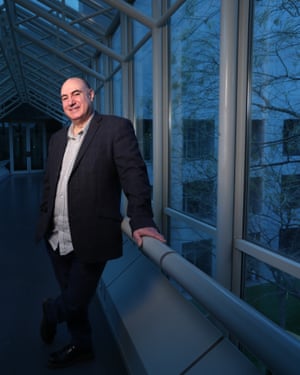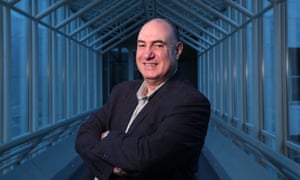St Vincent de Paul CEO John Falzon is running on a progressive agenda to represent the party in ACT’s newest seat
Neoliberalism is a “terrible disease” and the government’s proposed
income tax cuts would “rip the guts out of what remains of a progressive
taxation system”.
So says John Falzon, the chief executive of the St Vincent de Paul Society, who has launched his bid for Labor preselection in Canberra, the third and newest federal seat in the Australian Capital Territory.
While the timing of the election may be up in the air – September if you listen to Labor types; 2019 if you take Malcolm Turnbull at his word – the battle lines are already well drawn.
In the blue corner: “aspiration”, extending tax cuts for companies earning more than $50m a year and a $144bn income tax package that will most benefit those earning six-figure salaries. In the red corner: “fairness”, rolling back tax cuts, and more social spending and redistribution to those earning less than six figures.
Falzon, who has lived in Canberra since 2009 and is a member of the Australian Services Union, has the pedigree of a star Labor candidate.
"Massive tax cuts at one end will mean cuts to social services and social supports"
He worked in community development in public housing in south-west Sydney before joining St Vincent de Paul in 2001. Since 2006 he has led the charity that has been one of the most vocal critics of Coalition austerity budgets.
“I’ve learned a great deal from the people most affected by exclusion and inequality – the victims of neoliberalism,” Falzon tells Guardian Australia.
“For me, neoliberalism has never been an abstract concept because I’ve seen it played out in people’s lives, denying them access to the things ... such as housing and a job and income security.”
Falzon says charity has become “the default mode of delivering social security” under the Coalition, an outcome he describes as unjust and “unworthy of a society that seeks to be progressive and fair”.
“Neoliberalism is the aberration. We need to build a society that’s predicated on the principle of ‘from each according to their ability, to each according to their needs’,” Falzon says, quoting Karl Marx.
That, he says, means a tax system where “people contribute what they can”, and a strong social safety net.
“There is an alternative and it’s called government doing its job, which is ... to try and achieve the collective dreams of the many instead of pandering to the demands of the wealthy few.”
From mid 2024 the government’s tax package will flatten the tax scales so that workers earning between $40,000 and $200,000 pay the same marginal rate.
Falzon warns that would “ideologically reframe” the progressive tax system to “give a massive reward to the already wealthy”. This is on top of “massive corporate tax cuts down the track, whilst failing to deliver the things people need”.
“Massive tax cuts at one end will mean cuts to social services and social supports,” he says.
Falzon, a member of the left, is the standout candidate for Labor so far, and that faction is likely to determine the nomination. But there is still time for others to put their hands up for the prize seat.

So says John Falzon, the chief executive of the St Vincent de Paul Society, who has launched his bid for Labor preselection in Canberra, the third and newest federal seat in the Australian Capital Territory.
While the timing of the election may be up in the air – September if you listen to Labor types; 2019 if you take Malcolm Turnbull at his word – the battle lines are already well drawn.
In the blue corner: “aspiration”, extending tax cuts for companies earning more than $50m a year and a $144bn income tax package that will most benefit those earning six-figure salaries. In the red corner: “fairness”, rolling back tax cuts, and more social spending and redistribution to those earning less than six figures.
Falzon, who has lived in Canberra since 2009 and is a member of the Australian Services Union, has the pedigree of a star Labor candidate.
"Massive tax cuts at one end will mean cuts to social services and social supports"
He worked in community development in public housing in south-west Sydney before joining St Vincent de Paul in 2001. Since 2006 he has led the charity that has been one of the most vocal critics of Coalition austerity budgets.
“I’ve learned a great deal from the people most affected by exclusion and inequality – the victims of neoliberalism,” Falzon tells Guardian Australia.
“For me, neoliberalism has never been an abstract concept because I’ve seen it played out in people’s lives, denying them access to the things ... such as housing and a job and income security.”
Falzon says charity has become “the default mode of delivering social security” under the Coalition, an outcome he describes as unjust and “unworthy of a society that seeks to be progressive and fair”.
“Neoliberalism is the aberration. We need to build a society that’s predicated on the principle of ‘from each according to their ability, to each according to their needs’,” Falzon says, quoting Karl Marx.
That, he says, means a tax system where “people contribute what they can”, and a strong social safety net.
“There is an alternative and it’s called government doing its job, which is ... to try and achieve the collective dreams of the many instead of pandering to the demands of the wealthy few.”
From mid 2024 the government’s tax package will flatten the tax scales so that workers earning between $40,000 and $200,000 pay the same marginal rate.
Falzon warns that would “ideologically reframe” the progressive tax system to “give a massive reward to the already wealthy”. This is on top of “massive corporate tax cuts down the track, whilst failing to deliver the things people need”.
“Massive tax cuts at one end will mean cuts to social services and social supports,” he says.
Greens challenge
The Australian Electoral Commission will finalise the seat redistribution on Friday, after which Labor and the Greens will hold preselections.Falzon, a member of the left, is the standout candidate for Labor so far, and that faction is likely to determine the nomination. But there is still time for others to put their hands up for the prize seat.

The Greens have already leafletted the electorate, appealing to progressive voters to “make Canberra matter”, and urging them to achieve change with a protest vote against the major parties.
Tim Hollo, the executive director of the Green Institute thinktank who had been an adviser to former Greens leader Christine Milne, has nominated for Greens preselection but is precluded by party rules from giving interviews.
Hollo announced his candidacy on Facebook, promising “an engaging, bold, ideas-filled campaign”, and reflecting the party’s optimism by suggesting “we can bring this beautiful community on board and win this seat for the Greens”.
Since Ged Kearney recorded a thumping win in the Batman byelection, Labor’s confidence has been rising in its formula to stop the Greens’ march in inner-city areas: a progressive candidate, strong grassroots campaigning and a pitch to back candidates who want to change the party’s policy in areas such as asylum, which are usually its achilles heel in attacks from the left.
Policy battle on asylum
Falzon’s advocacy at the St Vincent de Paul Society certainly puts him to the left of Labor’s current positions, calling for a $75-a-week increase to the Newstart unemployment payment (Labor has promised a review) and restoration of the single-parent payments that were cut by the Gillard government (a decision the outgoing Labor social services spokeswoman, Jenny Macklin, has said she regrets).Falzon has put up his hand for preselection with his eyes open, saying it is a decision to “work within parliament and to be a voice within the Labor party caucus”.
“I really believe that in order to effect change, you have to engage with the structures that are responsible for that change, and so in this case, we’re talking about legislative structures,” he says.
But in some cases a change of law first requires a change of policy. One of the signal issues for the Labor left at the national conference, now deferred until December, will be whether it can achieve any change on asylum seeker policy, such as imposing time limits on offshore detention.
Falzon says his advocacy for a “fairer deal” for asylum seekers is “well known”.
“In deciding to run as a Labor candidate, that will mean taking that passion ... into the Labor party,” he says.
“I note that our policy will be determined at the national conference later this year, and I’m very, very sincerely hoping to see some progressive change in that area. It is something many people in the Labor party have been advocating for some time.”
It’s a hopeful but not strident message that embodies the promise of Labor left: change from within.

No comments:
Post a Comment